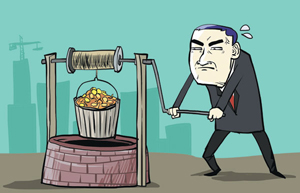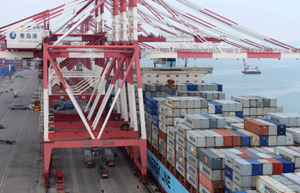Now as the world's second-largest economy, China's exceptional economic performance has been so eye-catching that many have forgotten how hard the country had struggled to kick-start its market economy.
China had cast away the way of political movement-centered national management and started to re-focus on economic growth as its newly found aspiration in the early 1980s. Behind that drive is the historic Third Plenary Session of the 11th Central Committee of the Communist Party of China, at which the nation's top leadership formally started to redress the wrong policies of the previous years and delivered the famous call of "free our mind and seek truth from facts".
It is not easy to free the mind. Ultra-leftist thinking remained powerful at that time and thwarted the smooth adoption of the market economy; a must-do choice after China's planned economy almost collapsed due to repeated political movements and the rigidity of the economic regime itself.
Still, market economy was a taboo. It was until in October, 1984 that for the first time, policymakers introduced the idea of commodity economy into its economic lexicon, paving the way for further liberalization of the economy and market-oriented reforms. At the Third Plenary Session of the 12th CPC Central Committee, which was held on October 20, 1984, the traditional concept that a planned economy cannot go with a commodity economy was dropped and it was declared that China will develop a socialist commodity economy.
The session decided that the nation should learn from the valuable experiences of all countries, including those capitalist economies, to promote productivity and build a socialist commodity economy. The development of commodity economy, it said, is a necessary precondition for China's economic modernization.
"Commodity economy" is virtually a euphemism of "market economy" at that time, when people are not very knowledgeable about the idea of market economy and it also seemed too radical for policymakers to explicitly assert their intent of building a more efficient economic system where the market plays an important role in distribution of resources.
The groundbreaking introduction of the idea of commodity economy carried on the economic platform fixed at the Third Plenary Session of the 11th CPC Central Committee and served as a springboard for the country to gradually usher in a more mature market-based economy - China formally endorsed the socialist market economy in 1993 and joined the World Trade Organization in 2001, ultimately leading to its current economic prowess.
The decision to build a planned plus commodity-based economy is in line with realities. Five years after the country started its reform and opening up drive in late 1970s, people were no longer satisfied with the scarcity of commodities in the market. They are eager to have access to freer supply of commodities to improve their living standards.
According to historians on China's commercial economy, people at that time needed to queue for a long time if they wanted to buy state-of-the-art household electronic appliances, such as refrigerators, washing machines and TV sets. They may need to start to queue one or two days ahead of the formal release day, reflecting the inability of the economy to meet the growing demand for various commodities.
Controversies surrounding commodity economy, however, abounded. The ultra-leftist forces had never given up their efforts to return to the planned management and refuse the role of the market, making China's road of economic liberalization bumpy. However, the forces of market-based reforms have been unstoppable and today; it has built itself into a strong and almost full-grown market economy.
|
 |
 |
| Time for government to continue cracking whip for sustained progress | Slower growth likely in 2015 |
